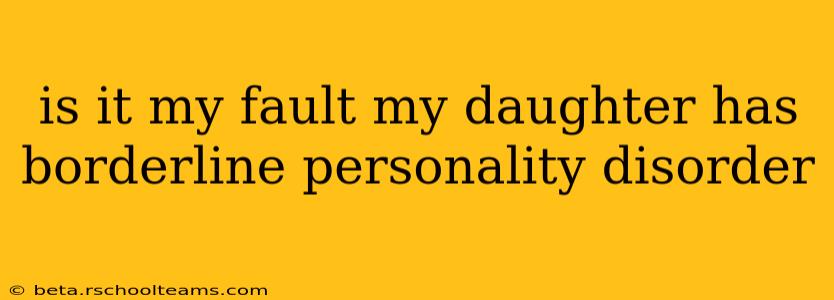Is It My Fault My Daughter Has Borderline Personality Disorder?
It's a question that haunts many parents: Is it my fault my child has a mental illness like borderline personality disorder (BPD)? The short answer is an unequivocal no. BPD, like most mental illnesses, is complex and doesn't have a single cause. While parenting styles and childhood experiences can certainly influence a person's development, they are not the sole or primary cause of BPD. Blaming yourself won't help your daughter, and it will only add to your own emotional burden.
Let's explore this further and address some common concerns parents may have:
What Causes Borderline Personality Disorder?
The exact causes of BPD aren't fully understood, but research points to a combination of genetic, biological, and environmental factors.
-
Genetics: Studies suggest a genetic predisposition to BPD. Having a family history of mental illness, including BPD, increases the risk. However, having a family history doesn't guarantee a child will develop BPD.
-
Brain Structure and Function: Research indicates differences in brain structure and function in individuals with BPD compared to those without. These differences may affect emotional regulation, impulse control, and interpersonal relationships.
-
Environmental Factors: These are crucial and can interact with genetic predispositions. Experiences like childhood trauma (physical, sexual, or emotional abuse; neglect; parental loss or separation) significantly increase the risk of developing BPD. However, it's essential to remember that many individuals who experience trauma do not develop BPD. Resilience, protective factors, and access to supportive resources play a vital role.
Could My Parenting Have Contributed?
It's natural to reflect on your parenting and wonder if you could have done things differently. While your parenting style might have influenced your daughter's development, it's crucial to understand that it's highly unlikely to be the sole cause of BPD.
Factors like:
- Inconsistent parenting: Unpredictable discipline or emotional support.
- Invalidation of feelings: Dismissing or minimizing your child's emotions.
- Emotional neglect: Lack of emotional responsiveness or support.
...can contribute to difficulties in emotional regulation and relationship development, making someone more vulnerable to developing BPD. However, these are only risk factors, not definitive causes. Many individuals raised in similar environments do not develop BPD.
How Can I Support My Daughter?
Focus your energy on supporting your daughter's treatment and recovery. This includes:
- Seeking professional help: Encourage your daughter to work with a therapist specializing in BPD. Dialectical Behavior Therapy (DBT) is a commonly used and effective treatment.
- Educating yourself: Learn about BPD to better understand your daughter's experiences and behaviors.
- Maintaining healthy boundaries: Protecting your own emotional well-being is crucial.
- Offering unconditional love and support: Let your daughter know you love and accept her, regardless of her diagnosis.
What If I Feel Guilty?
Feeling guilty is a normal human response in this situation. However, dwelling on guilt will not help you or your daughter. If you are struggling with intense guilt or self-blame, seeking therapy for yourself is essential. A therapist can help you process these feelings and focus on supporting your daughter effectively.
Remember, BPD is a complex mental illness with multiple contributing factors. It's not a reflection of your parenting skills or your worth as a parent. Focus on supporting your daughter's treatment and recovery, and seek professional help for yourself if you're struggling to cope.
